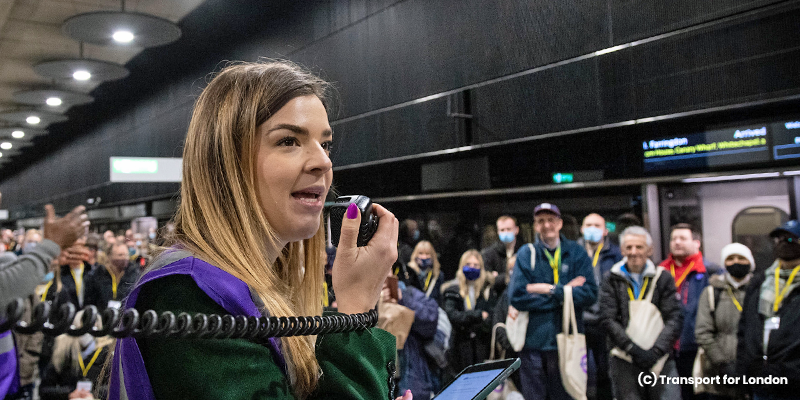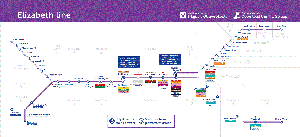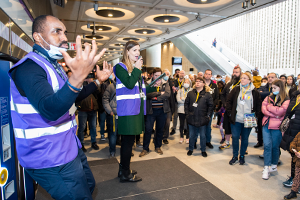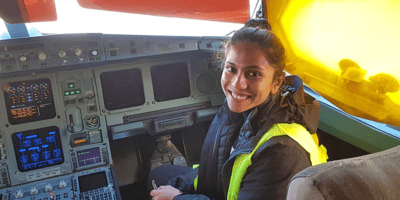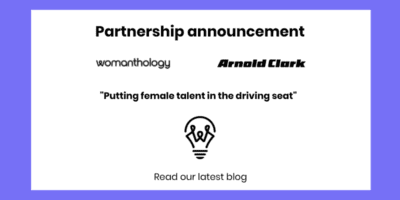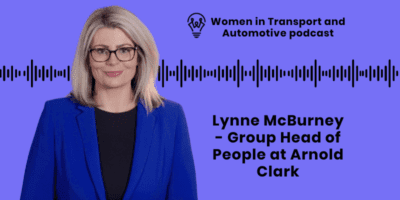Rebecca Le Count is currently a senior operations consultant at Arup following success in her role delivering Operational Readiness for Transport for London (TfL) on the Elizabeth line. She studied for a BSc in Criminology and Sociology at Royal Holloway, the University of London, before working in the charity sector. In her charity sector roles, Rebecca worked on children’s mental health, prison and supported housing sectors before she was headhunted to work on the Elizabeth line project due to her varied background and fresh perspective.
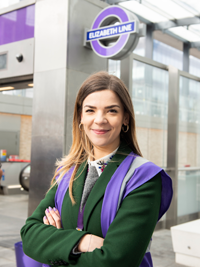
“My advice to girls and women coming to transport careers from different subject backgrounds is that transferable skills are everything. Don’t worry about having the perfect interview answer or direct experience as long as you can prove you have experience that’s transferable.”
Tangibly beneficial
I always thought I’d do a psychology degree as a teenager, but I stumbled across the more niche topic of criminology. It seemed to take all the bits of psychology I was interested in and added a lot of behavioural sociology and history, and I was hooked…
My degree really ignited my passion for working on something that’s tangibly beneficial to others in some way, which led to a career spanning children’s mental health, prison and supported housing sectors before being headhunted for my more recent role on the Elizabeth line – the newest line on London’s transport network and the biggest infrastructure project in Europe at the time.
The sad passing of Queen Elizabeth II makes the time I spent working on the Elizabeth line all the more poignant and special. She will be greatly missed by all whose lives she touched around the world and I was so fortunate to see her open the line earlier this year.
In addition to my work in transport, I have also been able to see young ex-offenders’ lives changed, to give Christmas gifts to children who otherwise wouldn’t be getting any, and now I can add playing my role in opening the Elizabeth line to the list.
Safety first
Working on the Elizabeth line, I was part of the Operational Readiness team, who were tasked with ensuring (in a nutshell) that the Elizabeth line was safe and ready to open to the public. The team led a programme of 150 different scenario-based trials to test that the people, processes and rules all worked as they’d been designed and everyone working on the railway could respond safely, quickly and effectively.
The scenarios ranged from a swan on the tracks stopping a train (yes, really) to mass evacuations of passengers from a train in the tunnel. Those mass evacuations were my responsibility in their entirety — I recruited and managed 5,500 volunteers (made up of staff and their families as well as partner organisations) to pretend to be passengers as we tested seven different evacuation processes, every weekend for five weeks.
I was responsible for the safety and wellbeing of the volunteers, for the recruitment and communication with them, including delivering a speech to thousands on each exercise, for managing the staffing of the events right down to procuring special Elizabeth line pin badges as a thank you to our volunteers for giving up their weekends.
In between all of this though, you could often find me in the Control Centre overseeing a smaller scale exercise (trespasser on the line springs to mind) or out on the Elizabeth line network making the scenarios happen by directing drivers and station staff to do something to create the simulations.
A spinner of many plates
There were a lot of challenges on the project, but personally it was all about stakeholder management and great communication. I was spinning lots of plates and trying to keep multiple partners happy, each who had many individuals working on the same workstream with their own objectives.
-
Image © Transport for London
Relying on clear communication, my engagement skills from working in the charity sector and attempting a sense of humour got me through, but also remembering that we all wanted the same thing, we are all human and we were all under the same pressure. Having said that, Storm Eunice nearly derailing one of the exercises was an interesting weekend to say the least!
Proud and amazed
My friends would roll their eyes at me for talking about it AGAIN but I completed my first triathlon last year, which was a huge achievement for me – it’s something I’m proud (and amazed!) that my body was able to do! But professionally, I will never forget the moment we sent off our last batch of volunteers on our last exercise, the wave of euphoria and sense of accomplishment was huge as the train with volunteer passengers on pulled out of Paddington station.
I remember heading down the platform, cheering to my colleague, hugging and jumping up and down — something I was teased for later as the Control Centre staff saw the whole thing on CCTV! To have pulled off a successful programme, passed every exercise and have 5,500 happy, excited volunteers was a huge achievement and something I still prattle on about!
Practice makes perfect
Without the volunteers bringing a human aspect to the evacuation scenarios, we could have still said that the process works, but we wouldn’t have had any sense of the realism of evacuating passengers. We had a range of different ages and individual needs, including guide dog users, wheelchair users, people with sensory conditions amongst other needs on our exercises to prove that we can look after everyone when evacuating. I also arranged for us to have a British Sign Language interpreter.
We also learned how long these things actually take, and as such have been able to prioritise which approach should be tried first. One of the biggest learnings from the exercises was that the volume of announcements wasn’t loud enough – something that’s seemingly small but is actually essential, and we wouldn’t have known this without our volunteers simulating a bustling train with 1,000 people on it!
Colleagues on the Elizabeth line, at TfL and London Underground and with our partners MTR Elizabeth line and Network Rail were what made the whole programme possible, and in the end successful. It’s easy to understate just how many people were involved, who all went above and beyond — it was a huge collaborative effort and, I like to think now, a way of honouring the Queen by keeping her memory as an integral part of the daily lives of the people who use the line.
All projects large and small
PRINCE2 is a project management methodology, and it applies a variety of tools and processes to any project large or small, to standardise your approach and make sure the basics are covered. In my role on the Elizabeth line, it became particularly important when I was managing multiple exercises, each with their own overlapping processes, risk factors, comms pipelines, stakeholders and budget.
Having a methodology ensured I covered all the bases for every evacuation — making sure they were safe, on budget, on time and delivered what we wanted them to. Without a methodology, it would have been very difficult to keep it all in my mind and it becomes much more likely mistakes will be made.
Advice for girls and women interested in transport careers
My advice to girls and women coming to transport careers from different subject backgrounds is that transferable skills are everything. Don’t worry about having the perfect interview answer or direct experience as long as you can prove you have experience that’s transferable. I was explicitly hired for my fresh perspective and ability to look at things differently, and advocate for the passenger perspective rather than having lots of operational experience. Stay true to yourself and your strengths and if it’s the right opportunity for you it will work out!
A new track
I’ve joined a team at Arup that has a specialism in providing operational readiness strategy and support for a wide range of projects among other things – some of their team actually helped us design our programme and supported us during our exercises! I’m looking forward to getting my teeth into different sectors and being challenged by lots of new environments, but I will always treasure the memories made with the Operational Readiness team on the Elizabeth line.

